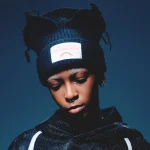It’s tempting to start this piece with “despite the odds” or “against the grain.” But let’s not. Because here’s the truth: femme-presenting artists in Cape Town and beyond aren’t breaking into the music scene — they’re helping build it. And if you’re not paying attention, you’re not just missing the moment. You’re missing the movement.
As we step out of Women’s Month, let’s drop the tired trope of the lone woman with a mic in a boys’ club. The real story — the ongoing story — is how femmes are headlining festivals, producing albums, packing out basements, commanding jazz clubs, electrifying punk gigs, and making sure that local music is as genre-bending, globally resonant, and emotionally expansive as it’s ever been. This isn’t about filling quotas. It’s about recognising that they are the scene.
Let’s zoom in.
In soul and its orbiting genres, Kristi Lowe crafts soulful pop narratives that live somewhere between heartbreak and healing. Luh’ra glows through her glittery indie-soul, her vulnerability a quiet rebellion. MANA brings jazz-schooled fluidity to neo-soul, while Mishy Kope layers Xhosa folk-soul with deep gravitas.
Adding to that soul‑pop spectrum is Gia McKay, whose acoustic‑pop‑infused contemporary soul is intimate, heartfelt, and emotionally rich. And Tessi Nandi, the 19‑year‑old Durban‑born, Mbombela‑raised multi‑instrumentalist now based in Cape Town, blends soulful R&B, pop, and jazz through poetic, guitar‑driven music — her honeycomb voice rests firm and articulate on deeply emotional lyricism.
Pop, often written off as “too commercial,” is quietly being subverted. Teagan, Anica Kiana and Tyler Page each write sleek, emotionally astute indie-pop with international resonance. Mikhaela Faye and Mila Smith amp things up with their pop-punk edge. Pixie Whip injects R&B-leaning hyperpop chaos, while Carla Franco’s bilingual hooks and slick production point to crossover potential. Fresh on that horizon, Hannah Ray — Cape Town-raised and recently signed to STAY LOW — melds soulful pop with orchestral songwriting and intimate, emotive performances that are impossible to ignore.
Erin Elliot and Amy Tjasink, co-founders of Pretty Loud, bring complementary voices to the scene — Amy with her acoustic-pop singer-songwriter roots and Erin with her polished, hook-driven edge. Together, they’re not only shaping their own sound but building collaborative, femme-centred pop spaces.
Jazz, often seen as sacred territory, is undergoing a soft revolution. giuliette price, with accompanying buttery and highly technical vocals, is phrasing poetry; Nobuhle Ashanti wields piano with both technical finesse and warmth; NALA Collective bridges African traditions with contemporary improvisation.
On the rock and punk end, Elle E delivers femme-fronted rock with bite. Kayla The Crow offers pop‑rock narratively cinematic enough for an indie film. And Cistamatic, with frontperson Gabi le Roux, courts confrontation in a punk space still largely bro‑coded.
Let’s talk rap and R&B. K.KEED is uncompromising, commandingly direct. Lúa, straddling R&B and rap, challenges softness/hardness binaries. Scintilla infuses elegance into late‑night reverb‑soaked honest tracks. Meanwhile, Hanna, the Zimbabwean‑Ethiopian wordsmith based in Cape Town, is a genre‑blending, boundary‑pushing rapper and singer whose work pairs self-assured lyricism with stoic musicality.
Jordan Baker brings a sultry, groove-driven approach to contemporary R&B, crafting tracks that glide between smoky intimacy and unapologetic confidence. Yamiko, meanwhile, threads soulful vulnerability through experimental R&B textures, pushing the genre into more atmospheric, genre-fluid territory. And FleeQy stakes her claim in hip-hop while leaning into R&B sensibilities — her sharp, rhythmic flows are grounded in swagger, but she tempers them with melodic touches that hint at her crossover potential.
And then there’s Azana, born in Chesterville, KwaZulu‑Natal. Her Afro‑pop fused with neo‑soul, Afro‑house, and amapiano earned her debut album Ingoma a No. 1 spot and platinum-certified single “Your Love”. She’s not just part of the ecosystem — she’s anchoring it.
In multimedia‑indie‑electro, Amy Ayanda, a Cape Town‑based visual artist turned songwriter, glues poetic lyricism to soft‑voiced electro‑indie soundscapes rooted in live instrumentation and visual artistry.
On the alt/indie front, Akeeda glides through glitchy production and confessional lyricism, stretching what “alternative” means here. Sophia Frank, 24, delivers raw‑voiced, lyrically sharp pop anthems that feel made for late‑night, sing‑along lows and highs.
And don’t sleep on the teen pop stars. Eva Marie, only 19 and Cape Town‑born, made emotional waves with her debut single “Hate You,” a gritty, story‑rich pop hit that already has listeners hooked.
Behind the decks, femmes are reshaping the culture. Mila Rose, Wata Mami, Lexa Gorlei, Mia Mia, Li’el, Black Villain, Senhorâ, Kay Faith, GHXST Bunny, Elle (yes, another Elle), and so many more aren’t just warming up crowds — they’re curating, innovating, headlining.
And it’s not just the artists. The scene is also sustained, shaped, and grown by women working behind the curtain: Tourmaline Berg (of AloeAloe, Quiet Life, and much more) making events happen across genres; Jackie Queens, who founded Bae Electronica and manages global South African DJ DESIREE; Tecla Ciolfi, founder of Texx and the City, one of South Africa’s most influential music platforms; Georgia Jones, founder of Rhapsody Studios, artist manager, and key new player at espAfrika and Cape Town Jazz Fest; Candice Horn, who runs The Commons in Muizenberg, one of the city’s most inclusive venues; Bianca Naidoo (“Aunty B”), whose leadership of Cotton Fest and other initiatives continues to shape youth culture; and Sevi Spanoudi, founder and CEO of Black Major, one of the country’s leading artist management agencies.
This list? It’s just a snapshot. A starter pack. We could write volumes — to all the femmes not named here, building empires in bedroom studios and small clubs: you are seen.
No, this isn’t about exceptions or underdogs. It’s the actual terrain of Cape Town’s music. Women, femmes, and non-binary artists aren’t waiting for inclusion — they’re writing the script in real time, drum machine by melodic hook, soundscape by sultry lyric.
And the best part? They’re just getting started.
Photo Credit: Erin de Swartd



